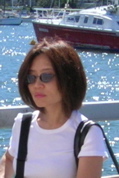|
|
|
Kumiyo Nakakoji is a Full Professor at Kyoto University Design School, and the Director at Key Technology Laboratory, Software Research Associates, Inc., Japan. She was a Full Professor at Research Center for Advanced Science and Technology (RCAST), University of Tokyo, Japan, where she co-directed the Knowledge Interaction Design Laboratory with Yasuhiro Yamamoto. She received the B.A. degree in computer science from Osaka University, Japan, in 1986, and the M.S. degree in 1990 and the Ph.D. degree in 1993, both in computer science from University of Colorado, Boulder, certified in Institute of Cognitive Science. Her advisor was Gerhard Fischer at the Center for LifeLong Learning and Design. She has served as chairs, editors, and committee members for a number of research communities, journals, and conferences, in the fields of Human-Computer Interaction, Software Engineering, and Design and Creative Knowledge Work Support, both locally and internationally. She was Chair of IPSJ SIGHCI, Japan. She was awarded CHI2002 Recognition Service Award from ACM SIGCHI in 2002, Distinguished Engineering Alumni Award from College of Engineering, University of Colorado, Boulder, in 2006, and JSAI Distinguished Service Award from the Japanese Society for Artificial Intelligence in 2010. Her research interests include human-computer interaction design and collective creativity, specifically Knowledge Interaction Design, which is a framework for the design and development of computational tools for creative knowledge work. Her latest work addresses cognitive and social factors of software development as knowledge-intensive collective creative tasks.
|
